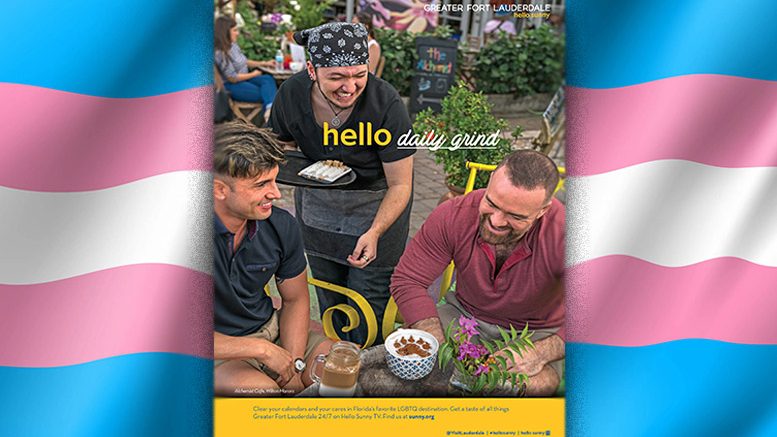Today’s Transgender Travel Experience; Unexpected Places Welcoming The Community
By: Andrew Collins*/TRT Travel Columnist—
The transgender travel experience is slowly improving for this community, but many obstacles remain.
“You could feel the electricity going through people. You could actually feel it. People were getting really, really pissed and uptight. I just said to myself, ‘Oh my God, the revolution is finally here,’ and I just like started screaming ‘freedom, we’re free at last!'” This is how Sylvia Ray Rivera, the Latinx transgender activist, described that momentous night of the Stonewall Riots, 50 years ago. Indeed, what most people consider the start of the modern gay rights movement began with a diverse crowd of patrons protesting outside the Stonewall Inn. Several of those brave souls, including Marsha P. Johnson—who would also become a prominent activist—were transgender.
For LGBTQ travelers, the world has changed dramatically, largely in positive ways, since 1969. While virulent homophobia and discrimination still exist in far too many places, destinations and travel-related businesses all over the world now enthusiastically court and welcome gay travelers. But for transgender travelers, measuring progress—and deciding where to plan vacations—is a bit more complicated than for many other members of the queer community.
“When travel locales are advertised to cisgender gay people, they tend to emphasize their own vibrant gay community,” said Gillian Branstetter, media relation’s manager of the National Center for Transgender Equality (NCTE), in Washington, DC. “Transgender people tend to be a bit more concerned with other issues while traveling, including their safety, privacy, and ability to go through airport security.”
“There aren’t really locations, cities, or resorts that target or market to transgender people as a community,” said Branstetter. And while this has long been the case, and that transgender travelers are primarily only marketed to as part of the broader LGBTQ community, some destinations have, albeit relatively recently, begun proactively reaching out to transgender travelers.
A prime example is Fort Lauderdale, where tourism officials worked diligently to successfully convince one of the world’s largest transgender gatherings, the Southern Comfort Transgender Conference (SOCO), to relocate there from Atlanta in 2015.
“Greater Fort Lauderdale is home to a thriving LGBT+ community, and we’re committed to inclusion and equality,” said Richard Gray, senior vice president of diversity & inclusion at the Greater Fort Lauderdale Convention & Visitors Bureau. “We’re continuously working to reach the transgender community to show them that we’re a destination that’s diverse, welcoming, authentic, and accepting—and most importantly, a destination where you can be free to be yourself.”
These efforts shine through in the visitor bureau’s marketing materials, which depict transgender people—it’s still rare to see trans representation in marketing materials produced even by destinations with otherwise strong LGBTQ content, but these efforts are finally beginning to happen. The SOCO Conference, which started in 1991, will take place this year August 15–17 at Fort Lauderdale’s historic Riverside Hotel, which is set amid the stylish boutiques and restaurants of Las Olas Boulevard and just a short drive from the city’s stunning beachfront. Events include a mix of social and networking events, from a pajama party and river cruise to several lunches and dinners out on the town. Throughout each day of the conference, seminars and workshops address a range of topics, from doctors presenting the latest in new treatments and medical procedures to experts on insurance, ID documentation, and many other important issues. It costs $125 to register for the conference (there’s an extra cost for some activities), and the Riverside Hotel offers attendees special rates starting at just $89 nightly.
Year-round, Fort Lauderdale has become one of the better destinations in the country for transgender travelers. The number of transgender residents is significant, and the broader LGBTQ community is more educated and in tune with issues that concern transgender people than in much of the country. This is generally the case among other cities with vibrant queer populations and progressive political leanings—think San Francisco, Washington, Portland, New York City, Seattle, and Chicago, to name a few. That said, according to a recent report by the NCTE, every single one of the police departments in America’s 25 largest cities has, thus far, failed to take adequate steps to ensure the safety and protect the rights of transgender people.
On a more positive note, the Human Rights Campaign has identified more than 225 U.S. cities that have implemented a nondiscrimination ordinance that specifically includes gender identity. Have a look at this list, and you’ll find quite a few surprises.
Tiny Montevallo is one of two municipalities (along with Birmingham) in Alabama that have such an ordinance. So, too, do nine cities in both Idaho and Kentucky. On the other hand, a number of prominent cities with sizable and highly visible transgender communities don’t have these local laws (many of them are, fortunately, in the 21 states with comprehensive statewide gender-identity protections).
For many transgender people thinking about where to travel, concerns are less about tourist marketing campaigns and even specific legal protections and more just about local attitudes and the degree to which they can expect to feel safe and represented. Even if, for example, several cities in Idaho and Kentucky forbid discrimination on the basis of gender identity, it doesn’t necessarily mean that these communities are especially woke in their attitudes about transgender rights.
“Lexington is fine but not like the West Coast,” said a transgender man (who requested anonymity) who moved to Kentucky a couple of years ago. “The biggest issue is bathrooms. Most of the restaurants and bars don’t have single-occupancy bathrooms, and there are a few places where it feels pretty impossible to use the bathroom—no locking doors, no stall. Even when I do find single-occupancy bathrooms here, they’re almost always gendered.”
Conversely, although Houston’s infamously failed to pass gender-identity nondiscrimination ordinance in 2015, it’s still one of the better cities in the country when it comes to LGBTQ visibility, and it has a large and dynamic transgender community and excellent resources. The same could be said for Atlanta, which does have a law protecting transgender people. But Georgia and Texas are among 19 states in the country that receive a negative rating from the Transgender Law Center on the basis of its gender-identity policies. In other words, there’s really no single metric or criteria for determining the transgender-friendliness of a place. Figuring this out requires a bit of sleuthing and ultimately considering a few different sources.
Travel-related business and tourism offices, however, can take significant steps toward helping transgender visitors feel more welcome and safe. Inclusive messaging does help, not only as a welcome sign to the transgender visitors but also to heighten the awareness of these issues among cisgender allies. Hotels, restaurants, bars, and retailers can provide sensitivity training to their staffs about using neutral gender pronouns, make an active effort to employ transgender workers and provide gender-neutral bathrooms.
The aforementioned NCTE is a tremendously helpful resource for transgender travelers. It has highly informative sections on its website related to travel issues and airport-security screening, a process that has become disturbingly more intrusive in recent years. According to the organization’s National Transgender Discrimination Survey, “nearly one in five transgender travelers reported being harassed or disrespected by airport security screeners or other airport workers.”
In the face of these realities, NCTE’s section on airport security offers tips on how to pack and prepare in advance of air travel, what to do if your official ID differs from how you present your gender, what to expect from airport body scanners and during pat-downs, how best to communicate with TSA personnel, and what steps to take in the event of mistreatment or discrimination by airline staff or other officials.
One factor that transgender travelers can consider when deciding where to go and which businesses to travel with is the degree to which companies have proactively worked to ensure the safety and comfort of their transgender employees and clients. For example, Delta Airlines recently added “unspecified” and “undisclosed” as gender options for its passengers who identify as nonbinary. And, Airbnb requires all of its hosts and guests to agree to an anti-discrimination policy that includes gender identity, and the company has also joined several amicus briefs in support of transgender students waging legal battles. Also, according to a spokesperson for the company, in 2018 Airbnb launched a transgender employee group, Trans@, and “medical coverage for employees has also been expanded to now follow the World Professional Association for Transgender Health (WPATH) standards of care.”
Delta and Airbnb are among dozens of travel companies that score a perfect 100 on the HRC Corporate Equality Index, along with American Airlines, Southwest, and United Airlines; Hilton, Hyatt, and Marriott hotels; Carnival and Royal Caribbean cruise lines; and many other prominent industry members.
*Writer Andrew Collins divides his time between Mexico City, Oregon, and New Hampshire. You can read more of his work at AndrewsTraveling.com.
[This was an exclusive story that first appeared in the New England Pride Guide 2019, produced in its entirety by The Rainbow Times.]







